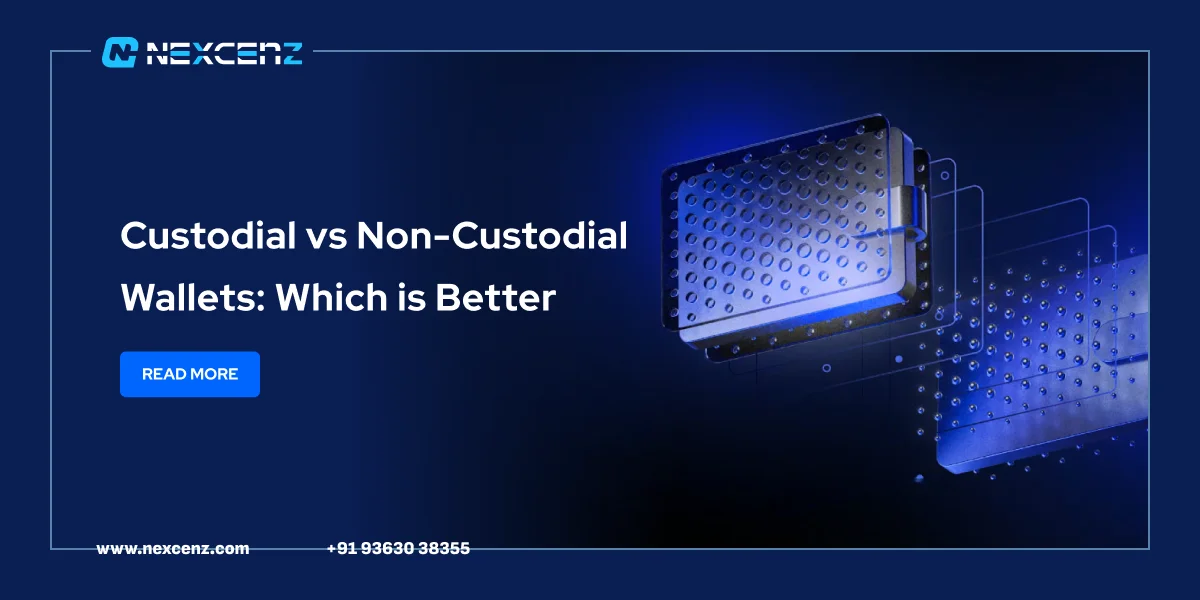
When stepping into the world of cryptocurrencies, one of the first and most important choices you’ll face is how to store your digital assets. Crypto wallets are the tools that allow you to access, send, receive, and manage your cryptocurrencies. But not all wallets are created equal. Understanding the difference between custodial and non-custodial wallets is essential for anyone serious about managing their crypto safely.
At Nexcenz, we work with clients across the blockchain ecosystem to build secure and user-friendly wallet solutions. So let’s break it down in simple terms because storing your money shouldn’t be confusing, even if it’s on the blockchain.
Despite the name, a crypto wallet doesn’t actually store your coins. Instead, it stores your private keys, unique codes or seed phrases that prove your ownership of the coins stored on the blockchain. These keys allow you to move your crypto. Without them, access is impossible.
Think of it like this: the coins live on the blockchain. The wallet gives you the keys to open the door and move them.
You Don’t Hold the Keys - The Platform Does
A custodial wallet is one where a third party, usually a crypto exchange, holds your private keys for you. If you’ve bought Bitcoin or Ethereum on platforms like Binance, Coinbase, or HTX and left it there, you’re using a custodial wallet.
Easy Access and Beginner-Friendly
This setup is very convenient, especially for beginners. You simply create an account, log in with a username and password, and start buying or selling. If you forget your password, the platform helps you reset it. There’s no need to manage seed phrases or worry about storing 24 secret words.
The Trade-Off: Convenience vs Control
However, there’s a trade-off. Because the exchange holds the keys, you don’t fully control your crypto. If the exchange gets hacked, freezes your account, or goes out of business, you could lose access to your funds. It’s similar to keeping your money in a bank easy to access, but not entirely under your control.
Who Should Use It?
For casual users and those who trade frequently, custodial wallets are a practical option. But they do come with risks, especially in an industry where platform failures and security breaches are still possible.
What is a Non-Custodial Wallet?
You Hold the Keys – Full Control
Non-custodial wallets are all about self-custody. You hold your own private keys, and with them, full control over your crypto. Popular examples include MetaMask, Trust Wallet, and hardware wallets like Ledger.
Setup Includes a Seed Phrase
When you set up a non-custodial wallet, you're given a seed phrase, usually 12 to 24 words that acts as the master key to your wallet. If you lose this phrase, there’s no password reset. No customer support line. It’s gone for good.
More Security, More Responsibility
That said, this type of wallet offers greater freedom and higher security, as long as it's used correctly. Your assets are stored in a way that no one else can access unless they have your keys. There’s no risk of an exchange freezing your funds or going offline and locking you out.
Unlocks Web3 and Advanced Features
You also gain access to advanced blockchain features like DeFi apps, staking, NFT marketplaces, and more tools that custodial wallets usually don't support.
Non-custodial wallets are ideal for long-term holders, experienced users, and anyone serious about privacy and decentralization. But they do require a higher level of responsibility. You need to securely back up your seed phrase, protect your device, and make sure you understand what you’re doing.
There’s no one-size-fits-all answer here; it depends on your goals, experience, and how much responsibility you’re ready to take on.
If you're just starting out, custodial wallets make it easy to dip your toes into crypto without the fear of losing access due to a forgotten seed phrase. They’re great for buying and selling quickly, and they feel familiar just like using online banking.
But as you gain more experience or start holding larger amounts of crypto, switching to a non-custodial wallet gives you more control and security. It also opens up access to the full Web3 world, including decentralized finance, NFT marketplaces, and blockchain-based games.
We often advise a hybrid approach: keep some assets in a custodial wallet for everyday use or trading, and move your long-term savings into a non-custodial wallet that you control entirely.
Simple Analogy
To make things even clearer, think about how you store money in the real world. A custodial wallet is like having your money in a bank. You log in to your account, move money around, and trust the bank to keep it safe. If you forget your login details, you can reset them. But if the bank freezes your account or collapses, your access may be lost.
A non-custodial wallet, on the other hand, is like keeping cash in a safe at home. You have complete control, but if you lose the key or forget the combination, there’s no way to get your money back.
What We Recommend at Nexcenz
As a Crypto Wallet Development Company, we at Nexcenz believe in designing wallets that offer both security and usability. For most users, the smartest approach is a balance use custodial wallets for short-term trades or learning, and transition to non-custodial wallets as your confidence and investment grow.
If you’re holding significant amounts of crypto or want to explore DeFi and Web3 applications, self-custody is the way to go. But it’s vital to educate yourself and store your seed phrase securely offline, written down, and never shared.
On the other hand, if you're a beginner or only using small amounts, starting with a trusted exchange wallet makes sense. Just be aware of the risks and limitations.
Final Thoughts
The phrase "Not your keys, not your crypto" exists for a reason. In crypto, owning your assets means controlling the keys. But ownership also comes with the responsibility of securing those keys properly. Whether you choose custodial or non-custodial depends on your needs. But in all cases, understanding the difference is the first step toward becoming a confident, secure crypto user. And if you’re building a crypto product or need help developing your own wallet, Nexcenz is here to help. We simplify complex blockchain solutions into real-world, user-friendly products tailored to your business needs.
Customer feedback and reviews are our major concerns! Here we have shared a Ratings of our reputed clients








You let us know what you need, Technical experts will call to review your needs in detail.We promise to keep all information private.

